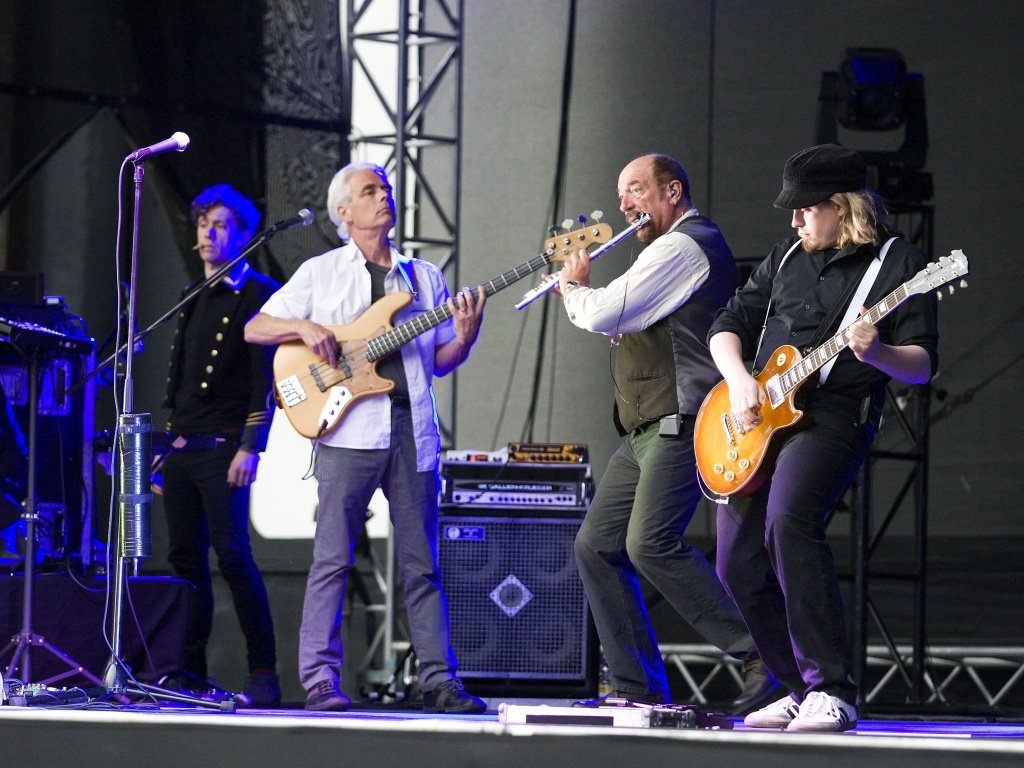Internationally recognized singer-songwriter, flautist, multi-instrumentalist, intellectual, raconteur, and Grammy Award-winner; Ian Anderson embodies all of these titles as front man for legendary British ensemble Jethro Tull.
Named for an 18th century British agriculturist who invented the seed drill, Jethro Tull is the name Anderson and his band mates adopted in 1968, after much deliberation.
“Puppet and the Puppet Master” from the “Curious Ruminant” album
The band’s debut album “This Was” was predominantly cut from the cloth of blues and jazz, featuring traditional songs like bluesman Doctor Ross’ “Cat’s Squirrel” and Rahsaan Roland Kirk’s flute-centric “Serenade to a Cuckoo.” As the years have progressed Anderson has remained the one true constant in the band, leading the group through evolving decades and stylistic forays into Celtic folk, classical, electronic, Eastern, and progressive rock.

Jethro Tull’s current release on Inside Out Records is called “Curious Ruminant” and it harkens back to, perhaps, that classic sound of folk and rock the band so deftly crafted during its late ‘70s period. “In some ways it embodies a lot of elements from the past as well as the present,” says Anderson about the current album. “The past in as much as the influences of classical music and folk music rise to the fore. But I think we, by and large, leave out the blues and jazz on this record. In some ways it borrows from albums like ‘Songs From the Wood’ or ‘Heavy Horses,’ without the subject matter being rustic or rural.”
“The Tipu House” from the “Curious Ruminant” album
Joining Anderson on the album are bassist David Goodier, multi-keyboardist John O’Hara, guitarist Jack Clark, drummer Scott Hammond, percussionist James Duncan and multi-keyboardist Andrew Giddings. “Curious Ruminant” follows on the heels of 2023’s “Rok Flote” and, while it is very much a collective band effort, it is also one of Anderson’s most personal statements to date. There are songs that reference his Scottish childhood like “Dunsinane Hill,” his study of human nature and society, with the title track and “The Tipu House” and his concern about the Middle East crisis and world affairs in “Over Jerusalem.”
When prompted to discuss his writing process, Anderson, in large part, does his homework in preparation for a recording. “It requires quite a bit of deliberate research,” says Anderson. “I want to know about something in order to either develop my own viewpoint or to check on facts. So I’m one of those people who donate money every year to Wikipedia for keeping the big train on the rails. And I think it’s something that’s rather important to do. But Wikipedia, like everything else, is subject to a degree of distortion.”

Along those lines, with the onset of artificial intelligence (AI) and deep fakery infiltrating the music and video worlds, Anderson himself has been the target of such technology’s dubious intentions. Understandably, the musical bard has some obvious strong emotions and opinions on the subject.
“Stygian Head” from the “Curious Ruminant” album
“My feelings on artificial intelligence are that it is a tool to be used,” says Anderson. “Creativity should be enhanced by artificial intelligence, not exchanged for it. Artificial intelligence is just a buzzword these days for something that has been growing a sophisticated set of algorithms for the last 20 years or more. And these days, if you use voice recognition to ask various apps to concoct some lyrics in the style of Ian Anderson, then they will do it. But having read some I can tell you that it’s garbage. It’s not what I would write. It’s a pastiche of ideas and words and phrases but it really doesn’t sound like me. I know what I would write and I wouldn’t write those things that I’ve read being ascribed to me in terms of artificial intelligence. I’m quite sure Beethoven would feel the same about his 11th, 12th and 13th symphonies should AI be employed to write those. He would probably be not just rolling over in his grave, but he would be coming back to haunt the bastards who ripped off his creativity.”
Throughout the course of Jethro Tull’s illustrious career Anderson has built a legacy of original and classic songs with incisive points of view on spirituality, homelessness, individuality, and critical thinking such as “Aqualung,” “Teacher,” “My God” and “Living in the Past.” He has always presented his art through a sharp and thoughtful lens; something the robotic mimickry of AI could never do.
“Look at the world of journalism. One celebrated well-known publication admitted that one of its entire editions had been written with AI,” observes Anderson. “That to me suggests something really quite unfortunate, that in after the fact, you then almost apologize to your readers. Oh, by the way, you should know we just did this to see what it would be like. But if anyone can do that, then fake news takes on a whole new meaning. It’s not just about deliberate rumor mongering and doing what I think has become commonplace in terms of pushing for a political slant on something. But the nuances just become a whole different kind of fakery. Hopefully there are journalists who still sit down and carefully choose their words and choose the way they represent things in order to give a clear, unbiased journalistic opinion. And those that do I think would be appalled to think that something was doing it for them. Because at the end of the day, trying to tell AI to have a conscience and to have an ethical responsibility is something I’m not sure AI is capable of, any more than how the computer HAL was in the movie ‘2001: A Space Odyssey.’”

In early March, 2025 “Aoide Magazine” did a piece on Hungarian bandleader and composer Leslie Mandoki and his ensemble Mandoki Soulmates. The Mandoki Soulmates is a rock, jazz and fusion big band that, over its 30-plus year existence, has featured some of the biggest names in popular music such as members from the band Toto, Cream’s Jack Bruce, Eric Burdon, Greg Lake, David Clayton-Thomas, and a head-spinning host of folks from all walks of the artistic spectrum. Anderson has been a charter member of the esteemed ensemble and shared some of his personal observations working with the group.
“Curious Ruminant” official video, from the “Curious Ruminant” album
“Leslie is primarily a record producer,” says Anderson. “He makes everything from advertising jingles for big car companies in Germany through to his attempts to break some new artists with music which he has co-written. He’s done a lot of different things, but he is a very professional person consumed with attention to detail. And he has a bunch of musical friends that he likes to work with because they are part of his growing years as a young musician in Hungary. And he reveres the work of, for instance, Al DiMeola amongst the various jazz people he uses. And then, of course, some of the great characters and musicians from the world of rock music, sadly many of whom are no longer with us, like Jack Bruce and Jon Lord. These are just two of the names, people I played with, who for me were part of my pre-Jethro Tull years when I was growing up. So, to have the opportunity to play, not once, but several times with Jack Bruce, and to play ‘Smoke on the Water’ with Jon Lord; these are the sort of moments that you treasure; playing ‘House of the Rising Sun’ with Eric Burdon and a string quartet. So yeah, there’ve been of bunch of things like that that happily due to Leslie, I got my four and a half minutes of, not exactly fame, but adoration of the great work of other artists. And I also got to meet Mikhail Gorbachev too through Leslie which was memorable since Gorbachev, for me, as well as many others, was the accidental hero of the second Russian Revolution. This was the period where Gorbachev really did, out of necessity, begin to recognize Glasnost and Perestroika. It was a move that many of us felt was going to bring Russia much closer to Europe and remove the pressures and fears of the Cold War. And for a little while it did. But we all know what happened when an ex-KGB colonel got the call to head up the Kremlin. And then things turned out bad again.”
One from the vault, “Living In the Past” from the album of the same name
For well over half a century Anderson has elevated the band and brand Jethro Tull to amazing heights, with incredible songs, memorable albums and landmark tours and performances. But you don’t stay on top of your game without a sense of mindfulness and taking stock in one’s own health and wellness. Known for his avid physicality and flamboyant live shows, Anderson offers sage advice and refreshing candor on his current state of being.

Ian Anderson of old
“I spent some time a couple of years ago really trying to rethink and relearn singing from a practical point of view,” says Anderson. “And I really spent some time, both in the context of singing live and in the studio, just rethinking it, because you start to develop a lot of bad habits as you get older. And I certainly don’t have the voice I had when I was in my twenties, or even in my thirties. I did a lot of damage to my voice pushing it too hard. And it will never be the same again. But I relearned the procedure to make the most of it. Two or three years ago my problems were partly aggravated by having been diagnosed with COPD. But I was later re-diagnosed with asthma, which is a pussycat compared to COPD and for which medication happily works for me. And so I don’t any longer struggle for breath or struggle to get through songs and passages of music that I did in 2000 and 19, 20, 21 and 22. Things are a lot easier now, thank goodness. You know, it’s just stopping and thinking about note production, voice production, breathing, and reading what people say about it. It’s about trying to right the wrongs of fifty years of irresponsible vocal behavior. But there are people with much worse problems than I have. I really can’t complain. I’m one of the lucky ones, at least so far.”
One mote from the vault, “Locomotive Breath” from the Aqualung album
For all the latest on Ian Anderson and Jethro Tull simply visit www.jethrotull.com .



